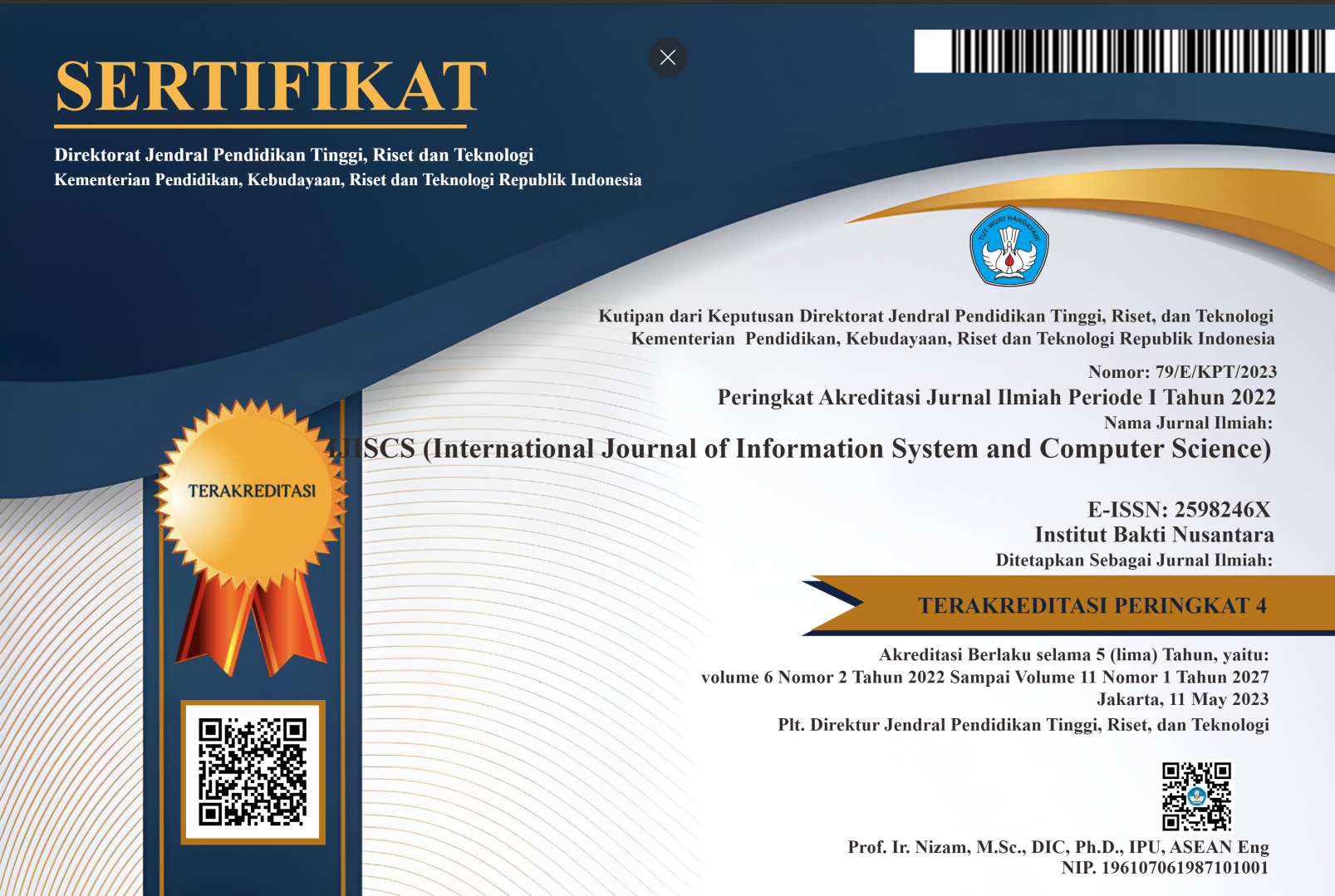LINEAR CONGRUENT METHOD (LCM) IN TESTING SYSTEM USING CLIENT-SERVER MODEL
(1) Informatics Engineering Study Programme, University Al Asyariah Mandar, Polewali Mandar
(2) Information System Study Programme, University Al Asyariah Mandar, Polewali Mandar
(3) Information System Study Programme, University Al Asyariah Mandar, Polewali Mandar
 Corresponding Author
Corresponding Author
Abstract
Keywords
References
N. Awad and M. Barak, “Learning about STEM in the ICT Environment–The Case of the Sound, Wave and Communication Systems Course,” in Proceedings of the 11th Chais Conference for the Study of Innovation and Learning Technologies: Learning in the Technological Era, 2016, p. 1E–7E.
N. W. S. Saraswati and D. M. D. U. Putra, “Sistem Ujian Online Berbasis Website,” S@ CIES, vol. 6, no. 1, pp. 21–30, 2015.
A. M. Yusuf, Asesmen dan Evaluasi Pendidikan. Prenada Media, 2017.
E. P. Widoyoko and P. T. O. UMPurworejo, “Penilaian Autentik Dalam Pembelajaran Vokasi Untuk Memperkuat Daya Saing Lulusan Pendidikan Kejuruan,” Artik. Penelitian) Purworejo UMPurworejo, 2016.
R. Arief and E. Suryani, “Sistem Dinamik Ujian Nasional Berbasis Komputer Untuk Meminimalkan Resiko Kecurangan Serta Meningkatkan Efektifitas Dan Efisiensi Anggaran,” INTEGER J. Inf. Technol., vol. 1, no. 2, 2017.
S. Sudaryati, “Pengembangan online test system untuk siswa Sekolah Menengah Atas,” 2016.
M. P. Ahmad Susanto, Teori belajar dan pembelajaran di sekolah dasar. Kencana, 2016.
A. Suryanto, “Evaluasi Pembelajaran di SD,” 2014.
M. Ridwan, H. Suyono, and M. Sarosa, “Penerapan Data Mining Untuk Evaluasi Kinerja Akademik Mahasiswa Menggunakan Algoritma Naive Bayes Classifier,” J. EECCIS, vol. 7, no. 1, pp. 59–64, 2013.
H. Öz and T. Özturan, “Computer-based and paper-based testing: Does the test administration mode influence the reliability and validity of achievement tests?,” J. Lang. Linguist. Stud., vol. 14, no. 1, pp. 67–85, 2018.
M. Kaiiali, A. Ozkaya, H. Altun, H. Haddad, and M. Alier, “Designing a secure exam management system (SEMS) for M-learning environments,” IEEE Trans. Learn. Technol., vol. 9, no. 3, pp. 258–271, 2016.
M. R. Patel, J. Vichich, I. Lang, J. Lin, and K. Zheng, “Developing an evidence base of best practices for integrating computerized systems into the exam room: a systematic review,” J. Am. Med. Informatics Assoc., vol. 24, no. e1, pp. e207–e215, 2017.
Y. M. IKBAL, “PENERAPAN APLIKASI REMOTE DESKTOP UNTUK MEMANTAU UJIAN BERBASIS KOMPUTER MENGGUNAKAN NETSUPPORT SCHOOL (STUDI KASUS: LABORATORIUM TEKNIK INFORMATIKA UNIVERSITAS PASUNDAN).” Fakultas Teknik, 2018.
S. A. Alhomdy, S. N. Abdullah, and M. N. Algabri, “Generating Random Data using 3 Nonlinear Functions,” Int. J. Comput. Appl., vol. 152, no. 4, 2016.
A. P. U. Siahaan, R. Rahim, and M. Syahrizal, “Modified Playfair Cipher Using Random Key Linear Congruent Method,” 2017.
D. Irsa, R. W. Saputra, and S. Primaini, “Perancangan Aplikasi Game Edukasi Pembelajaran Anak Usia Dini Menggunakan Linear Congruent Method (LCM) Berbasis Android,” J. Inform. Glob., vol. 6, no. 1, 2016.
A. Marwan, S. Sutardi, and R. Ramadhan, “PENERAPAN METODE LINEAR CONGRUENT METHOD (LCM) DALAM PERANCANGAN DAN PEMBUATAN GAME MONOPOLI EDUKASI UNTUK TOKOH PAHLAWAN NASIONAL,” semanTIK, vol. 3, no. 1, 2017.
M. Mesran, “PEMANFAATAN MOBILE DEVICE PADA UJIAN MATAKULIAH MENERAPKAN LINEAR CONGRUENT METHOD (LCM) BERBASIS ANDROID,” JURTEKSI, vol. 2, no. 2, pp. 80–85, 2016.
J. Ambrose, T. M. Rothwein, and K. W. Strobel, “Development tool, method, and system for client server applications.” Google Patents, 01-Apr-2014.
J. R. Fallows, F. J. Salim, D. B. Gaunce, and S. Eraiah, “Enterprise client-server system and methods of providing web application support through distributed emulation of websocket communications.” Google Patents, 04-Jan-2018.
L. Dalesio, “A Client/Server Architecture for Supporting Science Data Using EPICS Version 4,” EPIC Consulting, Jacksonville, FL (United States), 2015.
Article Metrics
Abstract View : 559 times
: 559 times Download : 140 times
Download : 140 times
DOI: 10.56327/ijiscs.v2i1.551
Refbacks
- There are currently no refbacks.






